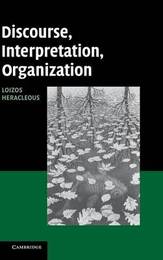
|
Discourse, Interpretation, Organization
Hardback
Main Details
| Title |
Discourse, Interpretation, Organization
|
| Authors and Contributors |
By (author) Loizos Heracleous
|
| Physical Properties |
| Format:Hardback | | Pages:218 | | Dimensions(mm): Height 229,Width 152 |
|
| Category/Genre | Organizational theory and behaviour |
|---|
| ISBN/Barcode |
9780521844024
|
| Classifications | Dewey:658.45 |
|---|
| Audience | | Professional & Vocational | |
|---|
|
Publishing Details |
| Publisher |
Cambridge University Press
|
| Imprint |
Cambridge University Press
|
| Publication Date |
26 October 2006 |
| Publication Country |
United Kingdom
|
Description
This much-needed systematic exploration of the emerging field of organizational discourse addresses scholarly perspectives and empirical applications of the concepts. The interpretive, functional, critical, and structurational perspectives are examined in detail. Issues discussed include the constructive potential of discourse; prominent interpretive approaches; the role of discourse, in particular metaphor, in fostering certain organizational outcomes; a critical view addressing the power and political dimensions of discourse; and the dual aspects of discourse as both communicative actions and deep structures, interrelated through the modality of interpretive schemes. Application chapters illustrate how discourse theory can be employed in field research, aiding the analyst in gaining a deeper understanding of the social context and of the effects of discourse on that context. In particular, a view of discourse as situated symbolic action, and a structurational view of discourse are illustrated empirically, using examples from a major IT organization and a global consulting firm.
Author Biography
Loizos Heracleous is an Official Fellow of Templeton College, Oxford University.
Reviews'This book will be valuable to discourse scholars and those interested in knowing more about discourse as a field and a methodology. It assists understanding of the different paradigms available, the implications of selecting specific approaches, and the practicalities of doing discourse analysis. It is an asset to the field.' Paula Jarzabkowski, Aston Business School and Advanced Institute of Management (AIM) 'This book is a welcome addition to the growing number of texts on organizational discourse. Loizos Heracleous provides a masterful discussion of key theoretical perspectives pertinent to this emerging field while also demonstrating its empirical applications. Moving quickly beyond surface level observations so as to explore the deeper implications of his work, he articulates his arguments in a clear and accessible style. These attributes translate into an intellectually stimulating book that will be an asset to those with research and teaching interests in organizational discourse.' David Grant, Professor of Organisation Studies, University of Sydney 'This is an exciting and masterful exposition of cutting-edge theory and research in the new field of organization discourse by one of its leading thinkers. The book is rich in ideas and applications making it an invaluable resource for students, teachers and researchers interested in the linguistic turn in the social and organizational sciences.' Robert J. Marshak, Scholar in Residence for Organization Development and Change, School of Public Affairs, American University, Washington DC 'This book is a very significant and valuable contribution to the extant literature on organizational discourse. In particular, it draws together and analyses the different paradigmatic approaches within the field in a thoughtful, informative and accessible manner. In my view, it is a must-read book for anyone with a genuine interest in organizational discourse.' Cliff Oswick, Chair in Organization Theory and Discourse, The Management Centre, University of Leicester 'Loizos Heracleous has been on an organizational "discourse journey" for well over a decade. His must-read book brings together in one fell swoop the multiple lenses needed for applying discourse to organizations. Skillfully interweaving empirical insights drawn from deep theoretical understandings his book provides us with practical outcomes for re-thinking organizations.' Ian Palmer, University of Technology, Sydney
|